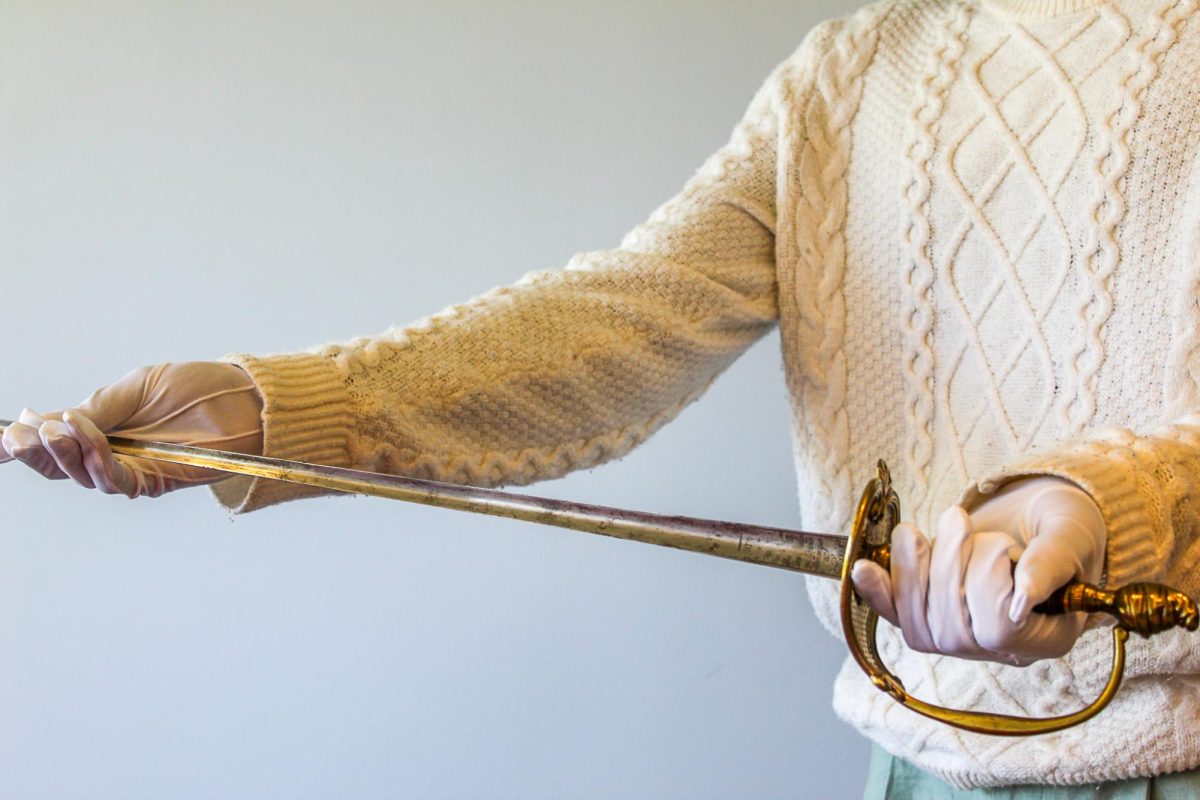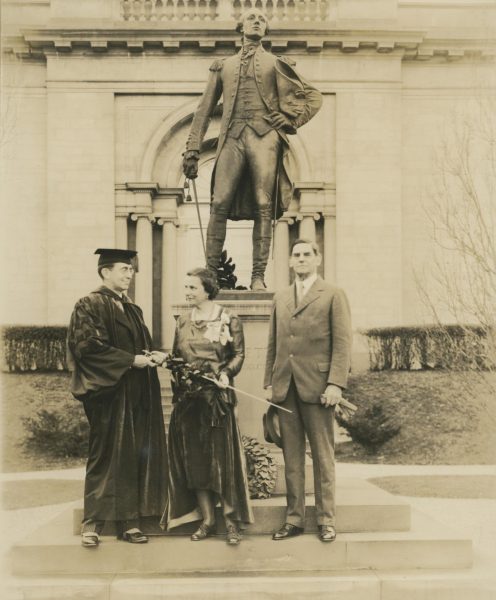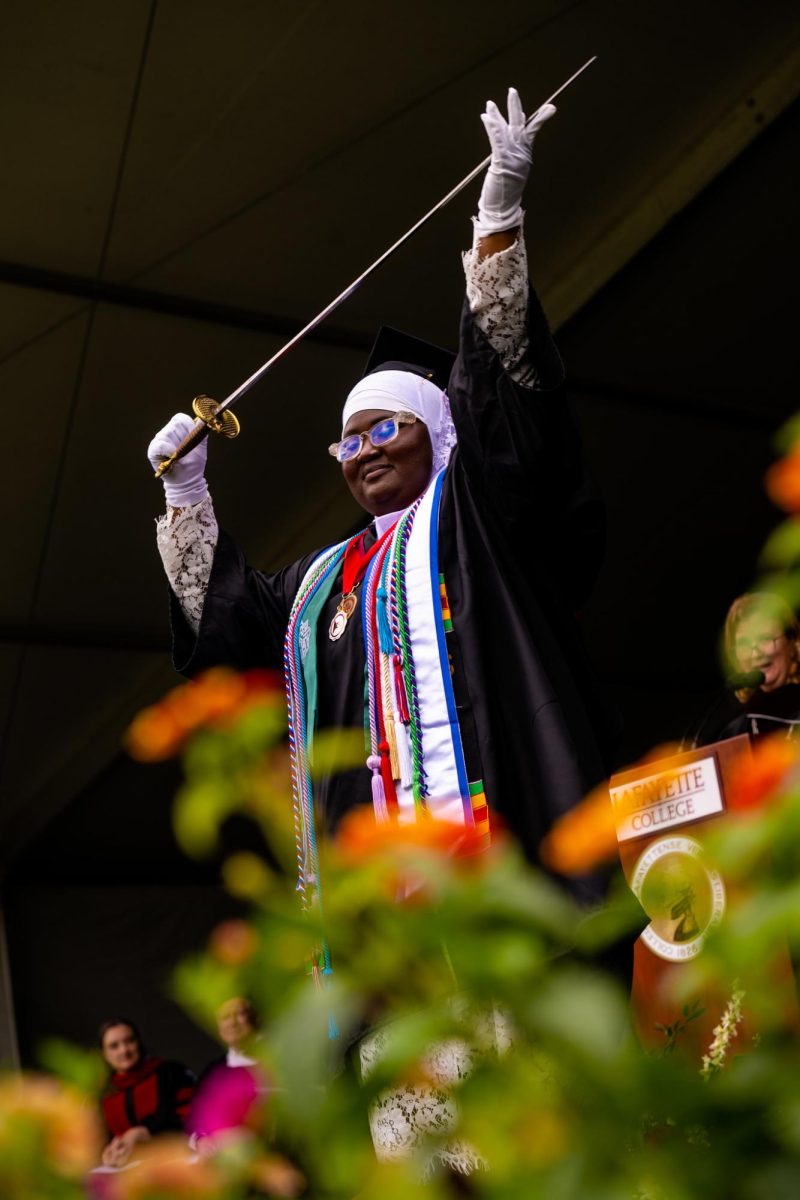The decade-old tradition of the Pepper Prize winner hoisting the Marquis de Lafayette’s sword at graduation will be discontinued after the committee overseeing the ceremony received concerns about the sword both as an aging artifact and as a supposed symbol of violence.
“To be fair, the Pepper Prize winner already gets a lot of recognition and a monetary prize, so I don’t think holding a sword is that important,” said Elle Lansing ‘26, who serves on the committee as Student Government communications officer.
Nicole Eramo, the college president’s chief of staff and another committee member, wrote in an email on behalf of the committee that the Pepper Prize winner will now wear a “special medal” featuring an image of and quote from the Marquis de Lafayette. The winner will also now lead the members of the senior class in moving their tassels from the right to the left side of their caps to signify that they have officially graduated.
The college archivist, Elaine Stomber ‘89, raised concerns about the potential for the sword – worth tens of thousands of dollars – to be damaged either by the elements or from mishandling after last year’s rainy commencement ceremony, which she could not attend. The college archivist typically supervises the handling of the sword at the commencement ceremony.
Pepper Prize finalists Emma Chen ‘24 and Remy Oktay ’24 said they were told by Tim Cox, the dean of advising and the overseer of the Pepper Prize process, that the college received a complaint from a professor who was upset because the sword, as Chen put it, “represented something that was used to kill and to hurt people.”
“They made the analogy that if Lafayette had used a rifle, we wouldn’t have the Pepper Prize winner hold up a rifle at graduation,” Chen recalled being told.
Cox, who does not serve on the commencement committee, was “looped in” on the committee’s discussions and ultimately supported its decision. Last week, he asked this year’s Pepper Prize finalists to suggest alternatives to the sword tradition. One suggestion was that the finalists receive a statuette of the Marquis de Lafayette, while Oktay would prefer for the winner to initiate a fireworks show at graduation.

Pepper Prize finalists were decidedly mixed on the committee’s decision.
“I disagree that raising a sword at graduation by a Pepper Prize winner sends the wrong message,” finalist Max Turkot ‘24 wrote in an email. “Lafayette was an army general. An officer’s sword has been a symbol of honor worldwide for centuries. We should pride ourselves on being students at a college carrying the name of the war hero of democracy, not shy away from it.”
Madaleine Perry ‘24, another Pepper Prize finalist, was also sad to see the tradition go, writing in an email that “I don’t think there is a moment that would make me, or anyone really, feel more like a badass than presenting the sword to everyone in attendance at commencement.”
Pepper Prize finalists Natalie Beckford ‘24, Courtenay Lampert ‘24 and Matwos Tadesse ‘24 were largely indifferent to the tradition’s end, the latter writing in an email that he is “not big on these kinds of traditions,” while Chen and Oktay were supportive of the decision.
Most of the finalists interviewed acknowledged the importance of preserving the over 230-year-old artifact, which was taken from the Marquis de Lafayette after he was imprisoned by the Austrians in the late 18th century. The sword was gifted to Lafayette College for its centennial celebration by Prussian aristocrats.

Graduation ceremonies as early as 1940 saw the leader of the graduation procession carry the sword. The current tradition began in 2014, the first commencement ceremony of the then-college President Alison Byerly.
“When I learned that the college owned a sword that belonged to the Marquis, I thought that incorporating the sword into commencement would be a fun way to symbolically honor that connection,” Byerly wrote in an email. “Lafayette College is so unusual in having a historical artifact of that kind, I hoped that including the sword would add a distinctive and memorable element to commencement, something special that only happens at Lafayette.”
Then-archivist Diane Shaw, a scholar of the college’s namesake, recalled in an interview telling Byerly that she worried that the sword was a “weapon of war” and that Byerly “might want to think of something else that wasn’t quite so militaristic.”
“We did talk initially about whether it might seem to glorify war, but people felt that if the sword was respectfully ‘presented,’ that is, held out in display with two hands, rather than wielded in one hand as in battle, it would evoke history rather than war,” Byerly wrote.
The sword was presented by the Pepper Prize winner without issue for the first couple of years, but as the tradition aged, “there were some who actually did some rather swashbuckling maneuvers with the sword,” according to Shaw.
Shaw could not recall the Pepper Prize finalists being instructed on how to wield the sword, other than to wear white gloves that would protect it from bodily oils. It was rusting left on those protective gloves by the sword that was the impetus for Stomber, the current archivist, to raise the issue with the commencement committee.
“If the Metropolitan Museum of Art had a similar sword in their arms and armor division, they probably wouldn’t allow it to be taken outside for an outside ceremony every year,” Stomber said.
Managing Editor Emma Chen ’24 did not contribute writing or reporting.








































































































Jimmy Pace • Apr 28, 2024 at 6:46 pm
This is insanity. The sword was used to fight against TYRANNY.
If you oppose Lafayette’s sword, then you support tyranny.